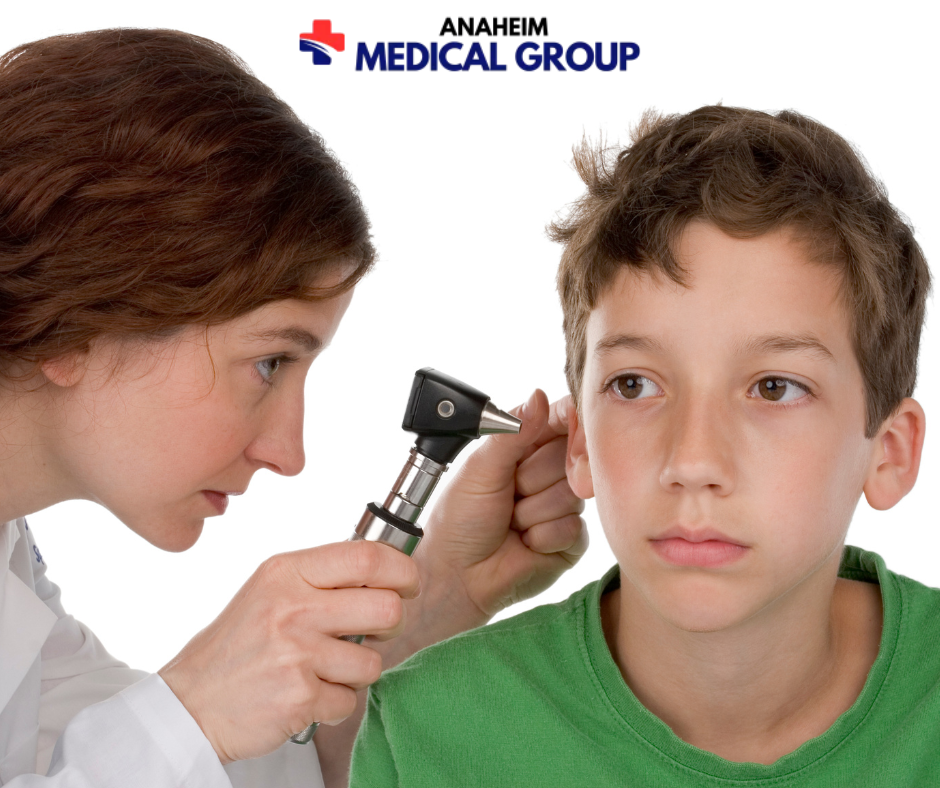Ear Infections in Anaheim: Comprehensive Care at Anaheim Medical Group
Ear infections are a common yet frustrating ailment that can affect individuals of all ages, especially young children. If left untreated, ear infections can lead to complications that may affect hearing, balance, and overall health. If you’re experiencing symptoms of an ear infection or concerned about your child’s discomfort, Anaheim Medical Group is here to help. This article will explore the causes, symptoms, treatments, and prevention strategies for ear infections, as well as how Anaheim Medical Group can provide the care you need. Whether you’re searching for information or ready to seek urgent care, you’ll find all the answers you need here.
Table of Contents
Understanding Ear Infections
Ear infections, also known as otitis media, occur when bacteria or viruses invade the middle ear, leading to inflammation and fluid buildup. They are particularly common in children but can affect adults as well. Ear infections are often painful and can cause discomfort in the ear, fever, and sometimes even temporary hearing loss.
There are different types of ear infections, each of which can present with unique symptoms and require specific treatments.
Types of Ear Infections
- Acute Otitis Media (AOM): The most common type of ear infection, AOM involves inflammation and infection of the middle ear. This type typically results in pain, swelling, and fluid buildup behind the eardrum.
- Otitis Media with Effusion (OME): This type involves fluid accumulation in the middle ear without infection. It can occur after an ear infection has cleared, and though not painful, it can cause a sensation of fullness and affect hearing.
- Chronic Otitis Media with Effusion (COME): In this case, fluid remains in the middle ear for an extended period or keeps returning, even without infection. It can cause ongoing hearing problems.
- Swimmer’s Ear (Otitis Externa): This is an infection of the outer ear canal, usually caused by water trapped in the ear after swimming, leading to bacterial growth. It’s characterized by ear pain, itchiness, and discharge.

Causes of Ear Infections
Ear infections are primarily caused by bacteria or viruses, often following an upper respiratory infection, cold, or sinus infection. When these conditions cause swelling in the nasal passages and throat, it can block the eustachian tubes—narrow tubes that connect the middle ear to the back of the throat—leading to fluid buildup in the middle ear.
In some cases, environmental factors, like second-hand smoke or seasonal allergies, can also increase the likelihood of developing an ear infection. Understanding the causes can help you take steps to prevent future infections.
Symptoms of Ear Infections
The symptoms of an ear infection vary based on the type and severity of the infection. Common symptoms include:
- Ear pain or discomfort, especially when lying down
- Hearing difficulty or muffled sounds
- Fluid drainage from the ear
- Fever, particularly in young children
- Trouble sleeping due to pain
- Irritability, especially in infants and toddlers
- Loss of balance or dizziness
In infants, ear infections can be harder to detect. Parents should watch for signs like constant crying, tugging at the ear, and difficulty feeding.
Preventing Ear Infections
Although ear infections are sometimes unavoidable, there are steps you can take to reduce the risk:
- Keep Ears Dry: For those prone to ear infections, especially swimmers, keeping ears dry can help. Using earplugs and thoroughly drying ears after water exposure is crucial.
- Avoid Second-Hand Smoke: Smoke irritates the respiratory system and can make ear infections more likely, especially in children.
- Practice Good Hygiene: Regular hand washing and avoiding contact with individuals who are sick can reduce the chance of respiratory infections that often lead to ear infections.
- Vaccinations: Keep your child’s immunizations up to date, particularly the flu shot and pneumococcal vaccines, which protect against infections that can cause ear infections.
- Breastfeeding: For infants, breastfeeding has been shown to reduce the risk of ear infections by boosting the immune system.
When to Seek Medical Help
If you or your child experiences persistent or severe ear pain, fever, hearing loss, or any unusual symptoms, it’s important to seek medical attention promptly. Untreated ear infections can lead to complications such as hearing loss, ruptured eardrum, or mastoiditis (an infection of the bone behind the ear).
Anaheim Medical Group offers expert care and treatment for ear infections in Anaheim, CA, and the surrounding areas. Our team of experienced healthcare providers is dedicated to diagnosing the problem quickly and providing effective relief.
Treating Ear Infections at Anaheim Medical Group
At Anaheim Medical Group, we understand how uncomfortable and worrisome ear infections can be. Our medical team is equipped to handle a wide variety of ear infections, from minor to severe, and offers a range of treatments designed to alleviate pain and promote healing.
Diagnosis and Evaluation
When you visit Anaheim Medical Group for ear infection treatment, our team will begin with a comprehensive evaluation of your symptoms. This often includes a physical examination and the use of an otoscope to look inside the ear for signs of infection, inflammation, or fluid buildup.
Treatment Options
Depending on the type and severity of the ear infection, treatments may include:
- Antibiotics: If the infection is bacterial, a course of antibiotics may be prescribed to clear the infection. It’s important to follow the full course of antibiotics, even if symptoms improve before the medication is finished.
- Pain Relief: Over-the-counter pain relievers like ibuprofen or acetaminophen can help reduce pain and fever associated with ear infections. Your doctor may recommend stronger pain relief if needed.
- Ear Drops: For outer ear infections, such as swimmer’s ear, antibiotic or antifungal ear drops may be prescribed to clear the infection and soothe discomfort.
- Warm Compresses: Applying a warm compress to the affected ear can help reduce pain and promote drainage of any built-up fluid.
- Myringotomy: In cases of chronic ear infections or fluid buildup that doesn’t resolve with medication, a minor surgical procedure called myringotomy may be recommended. This involves creating a small incision in the eardrum to drain fluid and relieve pressure.

Why Choose Anaheim Medical Group?
Anaheim Medical Group offers personalized care in a friendly, comfortable setting. Our Urgent Care clinic provides:
- Convenient Hours: Open Monday through Friday from 11 AM to 7 PM, and Saturdays from 11 AM to 5 PM, we offer flexible hours to fit your schedule.
- Urgent Care: No need to wait days for an appointment. We provide walk-in urgent care for ear infections and other health concerns, so you can get the treatment you need right away.
- Experienced Providers: Our team of skilled medical professionals is experienced in treating both adults and children, making sure every patient receives the best care possible.
- State-of-the-Art Equipment: Our clinic is equipped with advanced medical technology to ensure accurate diagnosis and effective treatment.
- Easy Appointment Booking: You can easily book an appointment online or call our clinic directly at (714) 827-9797 to speak with our friendly staff and schedule a time that works for you.
What to Do Before Visiting Anaheim Medical Group
If you’re experiencing symptoms of an ear infection, there are steps you can take at home to alleviate discomfort before visiting Anaheim Medical Group:
- Use a Warm Compress: Applying a warm cloth to the affected ear can help soothe pain and promote drainage of fluid.
- Stay Hydrated: Drinking plenty of water can help thin mucus and improve drainage from the eustachian tubes.
- Avoid Inserting Objects in the Ear: Never use cotton swabs, bobby pins, or any other objects to clean the ear, as this can push debris further into the ear canal and worsen the infection.
- Over-the-Counter Pain Relief: Medications like ibuprofen or acetaminophen can help manage pain and reduce fever.
- Rest: Getting plenty of rest allows the body’s immune system to fight off the infection more effectively.
Case Study: Treating Recurrent Ear Infections in Children
To illustrate the level of care you can expect at Anaheim Medical Group, let’s take a look at a real case study.
Patient: Emily, a 4-year-old girl, had been suffering from recurrent ear infections for over a year. Her parents were concerned about her frequent need for antibiotics and the potential impact on her hearing.
Treatment Plan: Upon visiting Anaheim Medical Group, Emily’s doctor conducted a thorough examination, including a tympanometry test to assess fluid buildup in the middle ear. After reviewing the results, the doctor recommended a myringotomy procedure to place tiny tubes in her ears, allowing fluid to drain and preventing future infections.
Outcome: After the procedure, Emily experienced significantly fewer infections, her hearing improved, and her parents were relieved to see her no longer in pain.
FAQs About Ear Infections

Q1: How Can I Tell If My Child Has an Ear Infection?
Ear infections are common in children, and recognizing the symptoms early can help you seek prompt medical treatment. Although younger children may not be able to verbalize their discomfort, they often show signs that something is wrong. Some of the most common symptoms of an ear infection in children include:
- Tugging or pulling at the ear: This is often one of the first signs parents notice, as children might pull on their ear in an attempt to alleviate the discomfort or pressure they feel.
- Irritability: If your child becomes unusually fussy or agitated, especially during or after a cold, it could be a sign of an ear infection.
- Fever: A temperature of 100.4°F (38°C) or higher can sometimes accompany an ear infection, especially in younger children.
- Trouble sleeping: Lying down can increase pressure in the ear, making it more painful. If your child has trouble sleeping or wakes up frequently during the night, an ear infection could be the cause.
- Fluid drainage from the ear: Clear or yellowish fluid draining from the ear is a telltale sign that the eardrum may have ruptured due to an infection.
If your child exhibits any of these symptoms, it’s a good idea to seek medical advice. Timely intervention can help alleviate the pain and prevent complications such as hearing loss or chronic infections.
Q2: Are Ear Infections Contagious?
An ear infection itself is not contagious, meaning you cannot “catch” an ear infection by being around someone who has one. However, the viruses and bacteria that can lead to ear infections are contagious. For example, if your child has a cold or respiratory infection caused by a virus or bacteria, these pathogens can spread through coughing, sneezing, or touching contaminated surfaces. Once in the body, these viruses or bacteria can travel to the ear, causing an infection.
To reduce the risk of spreading the germs that cause ear infections, practicing good hygiene is essential. Here are a few steps you can take:
- Wash hands regularly: Make sure your child washes their hands frequently, especially after sneezing, coughing, or playing with other children.
- Cover coughs and sneezes: Teach your child to cover their mouth and nose with a tissue or their elbow when they sneeze or cough to limit the spread of germs.
- Clean surfaces: Regularly disinfect commonly touched surfaces like toys, door handles, and countertops.
By practicing these hygiene measures, you can help lower the risk of spreading the illnesses that often lead to ear infections.
Q3: Can Ear Infections Cause Permanent Hearing Loss?
Most ear infections are temporary and do not cause lasting damage to the ear or hearing. In fact, the majority of children recover from ear infections with no long-term effects. However, if ear infections are left untreated or become chronic (occurring repeatedly over time), they can lead to complications that may affect hearing in the long term.
Here’s what to keep in mind regarding hearing loss and ear infections:
- Temporary hearing loss: Fluid buildup in the middle ear during an infection can cause temporary hearing loss. Once the infection clears and the fluid drains, hearing typically returns to normal.
- Chronic infections: Repeated infections can cause scarring or damage to the structures of the ear, potentially leading to more serious hearing issues.
- Untreated infections: If an ear infection is not treated properly, it can result in more severe problems such as a ruptured eardrum or the spread of infection to surrounding tissues, both of which can impact hearing.
If your child frequently suffers from ear infections or experiences hearing difficulties, it’s important to consult a healthcare provider to assess the situation and discuss possible preventive treatments, such as ear tubes, which can help prevent recurrent infections.
Q4: When Should I See a Doctor for an Ear Infection?
Most ear infections resolve on their own within a few days, but there are certain instances when you should see a doctor for further evaluation and treatment. Here are some guidelines for when to seek medical advice:
- Persistent symptoms: If your child’s symptoms persist for more than 48 hours without improvement, it’s a good idea to consult a healthcare professional.
- Severe pain: If your child is experiencing significant ear pain that doesn’t subside with over-the-counter pain relief medications, you should seek medical attention.
- Fever: A fever of 102°F (39°C) or higher that accompanies an ear infection can be a sign of a more serious condition and warrants a visit to the doctor.
- Fluid drainage: If you notice fluid (clear, yellow, or even bloody) draining from your child’s ear, it may indicate a ruptured eardrum or a severe infection that requires treatment.
- Hearing loss: If you suspect that your child’s hearing has been affected, even temporarily, it’s important to have a doctor evaluate the situation.
Prompt treatment can relieve symptoms and prevent the infection from worsening or causing complications, so don’t hesitate to visit a doctor if your child’s symptoms persist or worsen.
Q5: What Happens If an Ear Infection Goes Untreated?
While many ear infections clear up on their own, leaving an ear infection untreated can lead to several complications, some of which can be serious. If an ear infection is not properly managed, here are some potential risks:
- Hearing loss: Persistent fluid buildup or chronic infections can cause temporary or, in rare cases, permanent hearing loss.
- Eardrum rupture: In more severe cases, the pressure from fluid buildup can cause the eardrum to burst. While this often heals on its own, repeated ruptures can lead to long-term damage.
- Spread of infection: An untreated infection can spread to nearby structures, including the mastoid bone behind the ear (mastoiditis) or even the brain, though this is rare.
- Chronic otitis media: This condition occurs when ear infections become frequent and long-lasting, potentially leading to more serious complications such as the buildup of scar tissue in the ear.
If you suspect an ear infection, especially if symptoms are persistent or severe, seeking medical advice is essential to prevent these complications.
Q6: Can Adults Get Ear Infections?
Yes, although ear infections are much more common in children, adults can also suffer from them. Adults typically develop ear infections after a cold, flu, or sinus infection, but they can also be caused by allergies or respiratory conditions. The symptoms of an ear infection in adults are similar to those in children and include ear pain, fluid drainage, hearing loss, and dizziness.
Adults may be more likely to experience outer ear infections (otitis externa), often referred to as swimmer’s ear, due to water trapped in the ear canal, or middle ear infections (otitis media) resulting from colds or respiratory infections.
If you’re an adult experiencing ear pain, fever, or fluid drainage from the ear, it’s important to consult a healthcare provider. While most ear infections in adults are mild, they can lead to more serious problems if left untreated.

Conclusion: Trust Anaheim Medical Group for Ear Infection Care
Ear infections can be painful and disruptive, but with prompt and expert care from Anaheim Medical Group, you can find relief and prevent complications. Our compassionate team is here to help with accurate diagnosis and effective treatments tailored to your needs. Whether you’re dealing with a simple infection or more complex issues, Anaheim Medical Group is the trusted clinic for ear infections in Anaheim, CA.
Don’t let an ear infection keep you or your loved ones in discomfort. Book your appointment online or call our clinic at (714) 827-9797 to schedule your visit today. We’re open Monday through Friday from 11 AM to 7 PM and Saturdays from 11 AM to 5 PM, offering convenient hours to fit your busy schedule.
Page design by Expert WordPress Website Designer in Orange County

